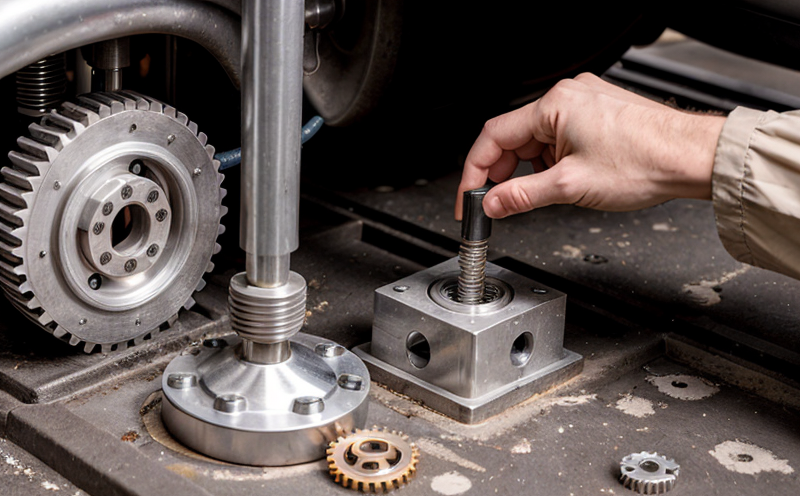ISO 306 Vicat Softening Point Testing
The ISO 306 standard specifies a method to determine the Vicat softening point of thermoplastics. This test is particularly important for ensuring that materials used in applications where heat resistance and durability are critical, such as automotive components or electronic enclosures.
The Vicat softening point provides crucial insights into the thermal stability of polymers by measuring the temperature at which a sample deforms under load. Understanding this property helps engineers design products that can withstand high temperatures without melting or deforming. This is essential for materials used in demanding environments, such as those found in aerospace and automotive sectors.
During the test, a sample of thermoplastic material is placed on a metal plate and subjected to a constant load. A standard needle is then lowered until it just touches the surface of the heated sample. The temperature at which this contact occurs is recorded as the Vicat softening point (VST). This value is critical for specifying materials that can maintain integrity under elevated temperatures.
The accuracy of ISO 306 testing is paramount in ensuring compliance with industry standards and regulatory requirements, especially in sectors like automotive manufacturing where material performance must meet stringent safety criteria. The test allows for the evaluation of various polymer types, including polyethylene (PE), polypropylene (PP), polystyrene (PS), and acrylonitrile butadiene styrene (ABS).
Standardization ensures that testing methodologies are consistent across different laboratories worldwide, enhancing reliability and comparability. This standard is widely recognized in the plastics industry for its robustness and precision.
The Vicat softening point test plays a vital role in quality control processes by identifying materials that meet specific performance criteria. It helps manufacturers avoid costly rejections due to non-compliance with design specifications, thus improving overall product quality.
Compliance with ISO 306 ensures that products are safe and reliable, meeting the stringent requirements set forth by regulatory bodies like the European Union's Directive on the Restriction of Hazardous Substances (RoHS).
Why It Matters
The Vicat softening point test is critical in various sectors where temperature resistance and material stability are paramount. In the automotive industry, for instance, components like engine covers or fuel lines must withstand high temperatures without deforming. The ISO 306 standard ensures that materials used meet these stringent requirements.
- Automotive Sector: Ensures that critical parts do not melt under engine heat.
- Aerospace Industry: Guarantees that fasteners and connectors maintain integrity at high altitudes.
- Electronics Manufacturing: Prevents circuit boards from melting during soldering processes.
The test is also important for compliance with international standards such as ISO 306, which helps ensure that materials used in these industries meet the highest safety and performance benchmarks. This standardization promotes global consistency and trust in the quality of products across different regions.
By accurately determining the Vicat softening point, manufacturers can select appropriate materials for their applications, ensuring durability and reliability under various operating conditions. Compliance with ISO 306 helps avoid potential product failures due to material inadequacies, thereby enhancing safety and performance in end-user applications.
Eurolab Advantages
At Eurolab, we offer comprehensive ISO 306 Vicat softening point testing services that cater to the specific needs of our clients. Our state-of-the-art facilities and experienced technicians ensure accurate and reliable results every time.
- Accurate Results: Our advanced equipment guarantees precise measurements that comply with international standards.
- Comprehensive Reporting: Detailed reports are provided, including graphs and tables for easy interpretation of test data.
- Expertise: Our team of qualified professionals ensures that the testing process is conducted according to best practices.
- Regulatory Compliance: We ensure that all tests meet relevant international standards like ISO 306, providing peace of mind for our clients.
Our commitment to quality and excellence sets us apart in the field of materials testing. Whether you are a manufacturer or an R&D engineer, Eurolab can provide the services necessary to ensure your products meet the highest standards.
We pride ourselves on providing not just testing but also valuable insights into material performance. Our detailed reports help our clients make informed decisions about material selection and process optimization. This expertise is crucial for maintaining a competitive edge in today's highly regulated market.
Use Cases and Application Examples
The ISO 306 Vicat softening point test finds application across various industries where temperature resistance and material integrity are critical. Here are some key use cases:
- Automotive Parts: Engine covers, fuel lines, and fasteners must withstand high temperatures without deforming.
- Aerospace Components: Connectors and fasteners need to maintain their shape at extreme altitudes and temperatures.
- Electronics Manufacturing: Circuit boards should not melt during soldering processes.
In addition to these, the test is also used in sectors like medical device manufacturing, where materials must meet stringent safety standards. The Vicat softening point provides crucial data that helps engineers design products that can withstand high temperatures without compromising on performance or safety.
For instance, in the automotive industry, the ISO 306 standard ensures that engine components are safe and reliable under extreme conditions. Similarly, in electronics manufacturing, this test guarantees that circuit boards remain intact during soldering processes. In medical device manufacturing, it helps ensure that materials used do not degrade at high temperatures, thus maintaining product integrity.
The versatility of ISO 306 makes it an indispensable tool for quality assurance and compliance across various industries. By providing accurate and reliable data on material performance under temperature stress, this test contributes significantly to the development of safe and effective products.





